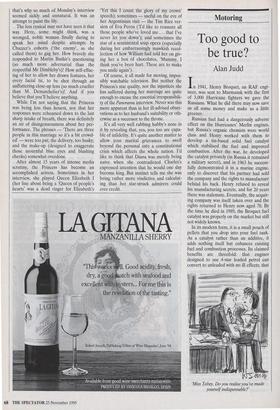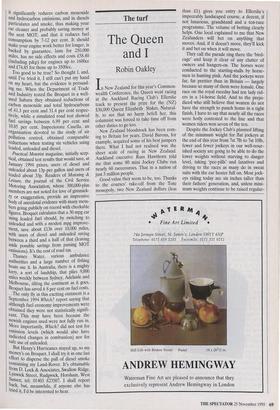Motoring
Too good to be true?
Alan Judd
In 1941, Henry Broquet, an RAF engi- neer, was sent to Murmansk with the first of 3,000 Hurricane fighters we gave the Russians. What he did there may now save us all some money and make us a little greener.
Russian fuel had a dangerously adverse effect on the Hurricanes' Merlin engines, but Russia's organic chemists were world class and Henry worked with them to develop a tin-based solid fuel catalyst which stabilised the fuel and improved combustion. After the war, he developed the catalyst privately (in Russia it remained a military secret), and in 1963 he success- fully demonstrated it in a marine engine, only to discover that his partner had sold the company and the rights to manufacture behind his back. Henry refused to reveal his manufacturing secrets, and for 20 years there was stalemate. Eventually, the acquir- ing company was itself taken over and the rights returned to Henry now aged 70. By the time he died in 1989, the Broquet fuel catalyst was properly on the market but still not widely known.
In its modern form, it is a small pouch of pellets that you drop into your fuel tank. As a catalyst rather than an additive, it adds nothing itself but enhances existing fuel and combustion processes. Its claimed benefits are threefold: that engines designed to use 4-star leaded petrol can convert to unleaded with no ill effects; that Miss Tobey. Do you realise you've made yourself indispensable?' it significantly reduces carbon monoxide and hydrocarbon emissions, and in diesels particulates and smoke, thus making your car cleaner and probably saving money at the next MOT; and that it reduces fuel consumption by 7-12 per cent. It should make your engine work better for longer, is backed by guarantee, lasts for 250,000 miles, has no side effects and costs £58.40 (including p&p) for engines up to 1600cc and £74.85 for those up to 3500cc. Too good to be true? So thought I, and, until I've tried it, I still can't put my hand 911 my heart, but the evidence is persuad- ing me. When the Department of Trade and Industry tested the Broquet in a well- used Subaru they obtained reductions of carbon monoxide and total hydrocarbons of 41.3 per cent and 31.4 per cent respec- tively, while a simulated road test showed fuel savings between 6.99 per cent and 10.85 per cent. Inspectorate Casella, an organisation devoted to the study of air pollution control, obtained comparable reductions when testing six vehicles using leaded, unleaded and diesel.
Practical Motorist magazine, initially scep- tical, obtained test results that would save, at January 1994 prices, users of diesel and unleaded about 13p per gallon and users of leaded about 33p. Readers of Motoring & Leisure, the journal of the Civil Service Motoring Association, whose 300,000-plus members are not noted for love of gimmick- ry or exaggeration, provide an impressive body of anecdotal evidence with many mem- bers going publicly on record with checkable figures. Broquet calculates that a 30 mpg car using leaded fuel should, by switching to unleaded and with a modest mpg improve- ment, save about £136 over 10,000 miles, With users of diesel and unleaded saving between a third and a half of that (leaving aside possible savings from passing MOT emissions). It's the cost of road tax. Thames Water, various ambulance authorities and a large number of fishing boats use it. In Australia, there is a mighty lorry, a sort of landship, that plies 9,000 miles weekly between Sydney, Adelaide and Melbourne, tilting the continent as it goes. Broquet has saved it 8 per cent on fuel costs. The only fly in this exciting ointment is a September 1994 Which? report saying that although fuel economy improvements were obtained they were not statistically signifi- cant. This may have been because the newish engines used were not fully run in. More importantly, Which? did not test for emission levels (which would also have indicated changes in combustion) nor for safe use of unleaded.
But Henry's Hurricanes stayed up, so my money's on Broquet. I shall try it in one last effort to disperse the pall of diesel smoke containing my Land-Rover. It's obtainable from D. Lock & Associates, Swallow Ridge, 14nwick Street, Rudgwick, Horsham, West Sussex; tel: 01403 823507. I shall report back, but, meanwhile, if anyone else has tried it, I'd be interested to hear.



















































































 Previous page
Previous page